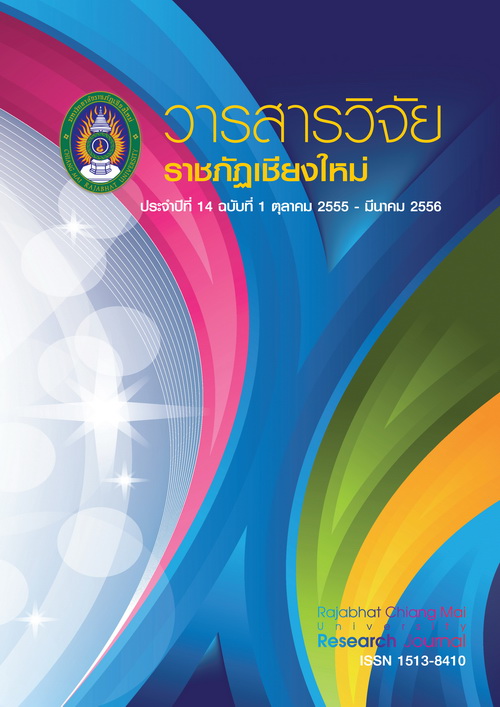รูปแบบการบริหารจัดการสืกษานอกระบบบนพื้นที่สูง เพื่อความมั่นคง
DOI:
https://doi.org/10.14456/rcmrj.2013.96126Abstract
การวิจัยครั้งนี้มีวัตถุประสงค์เพื่อศึกษาสภาพ ปัญหา และกำหนดรูปแบบการบริหารจัดการศึกษานอกระบบบนพื้นที่สูงเพื่อความมั่นคง ผู้ให้ข้อมูลหลักคือเลขาธิการสำนักงานส่งเสริมการศึกษานอกระบบฯ กลุ่มตัวอย่างคือ ผู้ว่าราชการจังหวัด ผู้อำนวยการสถานีวิทยุโทรทัศน์แห่งประเทศไทยประจำจังหวัด หัวหน้าฝ่ายจัดผังรายการสถานีวิทยุกระจายเสียงแห่งประเทศไทยประจำจังหวัด บรรณาธิการหนังสือพิมพ์ท้องถิ่นประจำจังหวัด ผู้อำนวยการสำนักงานส่งเสริมการศึกษานอกระบบฯ ประธานคณะกรรมการสถานศึกษา ผู้อำนวยการศูนย์การศึกษานอกระบบฯครูนิเทศบนพื้นที่สูง และครูประจำศูนย์การเรียนชุมชนชาวไทยภูเขา “แม่ฟ้าหลวง” เก็บรวบรวมข้อมูลโดยการศึกษาเอกสาร การสัมภาษณ์เชิงลึก การสังเกตประกอบการสอบถาม การอภิปรายกลุ่มเฉพาะ วิเคราะห์ข้อมูลโดยการหาความถิ่น ค่าร้อยละ ค่าเฉลี่ย ค่าเบี่ยงเบนมาตรฐาน การวิเคราะห์และสังเคราะห์เนื้อหา ผลการวิจัยปรากฏ ดังนี้
1. การบริหารจัดการศึกษานอกระบบบนพื้นที่สูงเพื่อความมั่นคงส่วนใหญ่จัดเป็น ศูนย์การเรียนชุมชนชาวไทยภูเขา “แม่ฟ้าหลวง” กลุ่มผู้!ม่รู้หนังสือ ใช้หนังสือแบบเรียนภาษาไทย หน่วยที่ 1 ประเทศของเรา และหน่วยที่ 2 ในหลวง'ของเราและกลุ่มการศึกษาขั้นพื้นฐานอยู่ในหมวดวิชาประสบการณ์ชีวิตสาระที่ 2 หน้าที่พลเมือง วัฒนธรรม และการดำเนินชีวิตในสังคม และสาระที่ 4 ประวัติศาสตร์ สอนโดยการแกฟ้ง พูด อ่าน และเขียน ร้องเพลงชาติไทย เพลงสรรเสริญพระบารมี และเพลงสดุดีมหาราชา เคารพธงชาติ สวดมนต์ไหว้พระแผ่เมตตา และเข้าร่วมกิจกรรมกับชุมชนในวันสำคัญข องชาติ รัฐให้ค่าใช้จ่ายรายหัว ค่าใช้จ่ายตามนโยบายเรียนฟรี 15 ปี มีครูประจำศูนย์ละ 1-2 คน ศูนย์การเรียนเป็นอาคารไม้การศึกษานอกระบบที่จัดโดยหน่วยงานอื่นได้แก่ รายการวิทยุรายการโทรทัศน์ และคอลัมน์ในหนังสือพิมพ์
2. ปัญหาในการบริหารจัดการศึกษานอกระบบบนพื้นที่สูงเพื่อความมั่นคง คือ ขาดสื่อการเรียนการสอนบุคลากรขาดขวัญและกำลังใจและขาดความรู!นการจัดการศึกษานอกระบบ หน่วยงานที่จัดการศึกษานอกระบบไม่ร่วมมือกันในลักษณะของ “เครือข่าย”
3. รูปแบบการบริหารจัดการศึกษานอกระบบบนพื้นที่สูงเพื่อความมั่นคง คือ LIFELONG Model
A Non-Formal Education Administration Model for Highland People and the Nation’s Security
The objectives of this research were to study the state and problems in non-formal education administration for national security and to formulate the non-formal education administration for national security model. The key informant was Secretary-General of the Office of Non-Formal and Formal Education. The samples were Chiang Mai, Chiang Rai and Mae Hong Son provincial governors, director of the Office of Radio of Thailand, director of the Office of Television of Thailand, editor of local newspaper in Chiang Mai, administrators of Provincial Office of the Non-Formal and Informal Education, chairman of school charter, administrators of district Non-Formal and Informal Education Centre, supervisors and teachers of the Mae Fah Luang Education Center for Highlanders. The data was gathered by documentary studies, in-depth interviews, observation, and asking, focus group discussion. The data was analyzed by using frequency, percentage, arithmetic mean, standard deviation, content analysis and synthesis. The results of this research are as follows.
1. The state of the non-formal education administration for national security is mostly in the form of Mae Fah Luang Education Center for Highlanders. For the literacy education uses the Thai subject textbook unit one in the topic of “Our Nation” and “Our King”. For the basic education uses the Thai subject textbook in the life experience unit and the second topic of “Duty of the Citizens”, Culture and Social living and the fourth topic of “History”. The teaching methods include of listening, speaking, reading and writing, national anthem singing, Long Life the King singing and Carol King singing, flag-raising ceremony, praying and participating in community activities on important days and festivals. The state subsidizes the per head budget for student and subsidizes the budget conforms the 15 years free learning project. There are 1-2 teachers for 1 learning center. The center buildings are made from the wood. The other non-formal education organizations were radio and television broadcasting and newspaper column.
2. The problems of the non-formal education administration for national security were educational innovation lacking, morale lacking of the persons, lacking of knowledge and teaching techniques of the persons, lacking of the non-formal education organization network.
3. The Non-formal Education Administration Model for National Security is “LIFELONG Model”
Downloads
Downloads
How to Cite
Issue
Section
License
1. Articles, information, content, images, etc published in the “Community and Social Development Journal” are copyrighted by the Community and Social Development Journal, Chiang Mai Rajabhat University. In order to properly distribute the articles through print and electronic media, the authors still hold the copyright for the published articles under the Creative Commons Attribution (CC BY) license, which allows the re-distribution of the articles in other sources. References must be made to the articles in the journal. The authors are responsible for requesting permission to reproduce copyrighted content from other sources.
2. The content of the articles appearing in the journal is the direct responsibility of the article authors. The editorial board of the journal does not necessarily agree with or share any responsibility.














